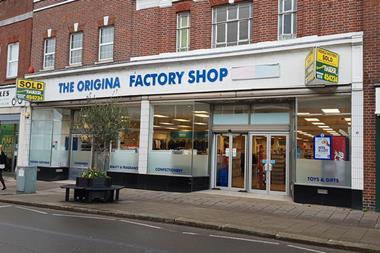Suppliers doubt regulation will rein in buyers says Elaine Watson
Whether a cynical PR stunt or a genuine attempt to improve relationships, Tesco’s latest overture to suppliers certainly shows initiative. Bosses are currently sifting through a pile of questionnaires filled in anonymously by suppliers telling the supermarket what they think of the way it deals with them.
The exercise, which Tesco has traditionally used to gain feedback from its staff, gives suppliers the opportunity to air their grievances without committing commercial suicide. It is also very timely, given that the OFT is just days away from publishing the results of a probe into the way supermarkets deal with their suppliers.
Fresh allegations of strong-arm tactics by the big four are published almost daily, and now the Mail on Sunday is on the case with its Supermarket Bullies campaign.
Competition minister Gerry Sutcliffe is now widely expected to call for action to tackle supermarket power. However, most suppliers do not hold out much hope that regulators can improve their lot.
Tightening up the code of practice, creating a new independent regulator or banning below-cost selling won’t change the dynamics of the market, argues one. Code or no code, Asda can delist a product without notice, Sainsbury can double its payment terms and Somerfield can demand swingeing cuts in invoice prices because they know they will get away with it. “It doesn’t matter if a retailer is breaching a code,” he says. “What matters is how much you need his business.”
Lib Dem rural affairs spokesman Andrew George, who has been lobbying the government to curb supermarket power, is more optimistic, however. His proposal - to appoint an independent food trade inspector to monitor trading relationships and name and shame retailers engaged in bad practice - could make a real difference, he says.“Obviously, I would like to see things such as fair-payment terms, or a ban on localised discriminatory discounting. But PR is also a powerful tool. From discussions I have had with some retailers, they would take something like this very seriously.”
Not many suppliers are convinced, however. “I have just seen huge year-on-year growth with one retailer and delivered exemplary service levels 365 days a year,” says one. “But I’ve lost the contract because I’m not prepared to reduce my price for the third year running when my costs are going up. Naming and shaming is all very well,” he adds. “But it won’t bring my business back.” Over-zealous buyers, he says, will not be stopped by regulators. “These are young, ambitious people under enormous pressure to meet targets.”
Nevertheless, suppliers aren’t letting the supermarkets have it all their own way. One own-label specialist says: “I know of several cases where an auction has been abandoned because it isn’t delivering what the buyer wants. I’m not saying suppliers have got together to scupper or fix the event. It’s more a case of low participation, or not playing the retailer’s game.”
Shrewder retailers do not waste their time using auctions unless they are sure they will get a result, he says. “Tesco or Asda would just pick up the phone and say, ‘I’ve got someone else that can do this product to the same spec as you for 50p cheaper a case - what can you do?’
He adds: “I know I’m not the only one to have sent a letter to Sainsbury saying that if they want to pay me later, they will have to renegotiate my terms. If they refuse to pay my invoices, I will refuse to supply them. It’s a risk I’m prepared to take.”
Other suppliers have also told Sainsbury and Somerfield what they can do with their unreasonable demands, he claims.
However, lobby groups calling for a more stringent supermarket code or an independent watchdog are probably wasting their time, he claims. “Having someone else to complain to anonymously, or waving a code at a buyer - even a new one that defines ‘reasonable’ behaviour - does not change the commercial realities of your relationship.”
Whether a cynical PR stunt or a genuine attempt to improve relationships, Tesco’s latest overture to suppliers certainly shows initiative. Bosses are currently sifting through a pile of questionnaires filled in anonymously by suppliers telling the supermarket what they think of the way it deals with them.
The exercise, which Tesco has traditionally used to gain feedback from its staff, gives suppliers the opportunity to air their grievances without committing commercial suicide. It is also very timely, given that the OFT is just days away from publishing the results of a probe into the way supermarkets deal with their suppliers.
Fresh allegations of strong-arm tactics by the big four are published almost daily, and now the Mail on Sunday is on the case with its Supermarket Bullies campaign.
Competition minister Gerry Sutcliffe is now widely expected to call for action to tackle supermarket power. However, most suppliers do not hold out much hope that regulators can improve their lot.
Tightening up the code of practice, creating a new independent regulator or banning below-cost selling won’t change the dynamics of the market, argues one. Code or no code, Asda can delist a product without notice, Sainsbury can double its payment terms and Somerfield can demand swingeing cuts in invoice prices because they know they will get away with it. “It doesn’t matter if a retailer is breaching a code,” he says. “What matters is how much you need his business.”
Lib Dem rural affairs spokesman Andrew George, who has been lobbying the government to curb supermarket power, is more optimistic, however. His proposal - to appoint an independent food trade inspector to monitor trading relationships and name and shame retailers engaged in bad practice - could make a real difference, he says.“Obviously, I would like to see things such as fair-payment terms, or a ban on localised discriminatory discounting. But PR is also a powerful tool. From discussions I have had with some retailers, they would take something like this very seriously.”
Not many suppliers are convinced, however. “I have just seen huge year-on-year growth with one retailer and delivered exemplary service levels 365 days a year,” says one. “But I’ve lost the contract because I’m not prepared to reduce my price for the third year running when my costs are going up. Naming and shaming is all very well,” he adds. “But it won’t bring my business back.” Over-zealous buyers, he says, will not be stopped by regulators. “These are young, ambitious people under enormous pressure to meet targets.”
Nevertheless, suppliers aren’t letting the supermarkets have it all their own way. One own-label specialist says: “I know of several cases where an auction has been abandoned because it isn’t delivering what the buyer wants. I’m not saying suppliers have got together to scupper or fix the event. It’s more a case of low participation, or not playing the retailer’s game.”
Shrewder retailers do not waste their time using auctions unless they are sure they will get a result, he says. “Tesco or Asda would just pick up the phone and say, ‘I’ve got someone else that can do this product to the same spec as you for 50p cheaper a case - what can you do?’
He adds: “I know I’m not the only one to have sent a letter to Sainsbury saying that if they want to pay me later, they will have to renegotiate my terms. If they refuse to pay my invoices, I will refuse to supply them. It’s a risk I’m prepared to take.”
Other suppliers have also told Sainsbury and Somerfield what they can do with their unreasonable demands, he claims.
However, lobby groups calling for a more stringent supermarket code or an independent watchdog are probably wasting their time, he claims. “Having someone else to complain to anonymously, or waving a code at a buyer - even a new one that defines ‘reasonable’ behaviour - does not change the commercial realities of your relationship.”


















No comments yet